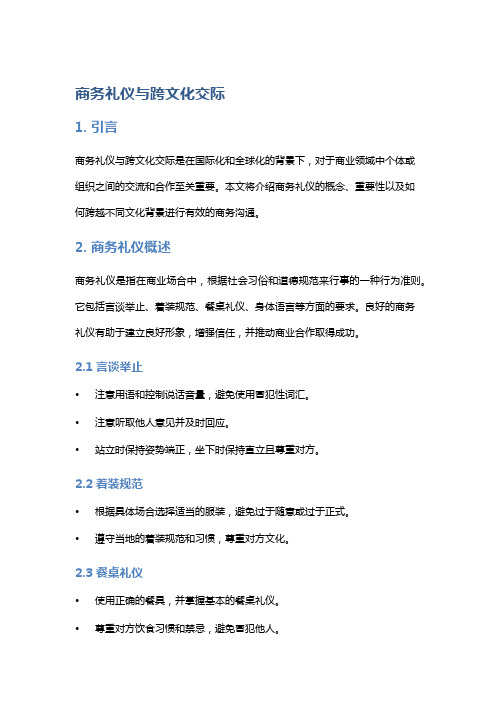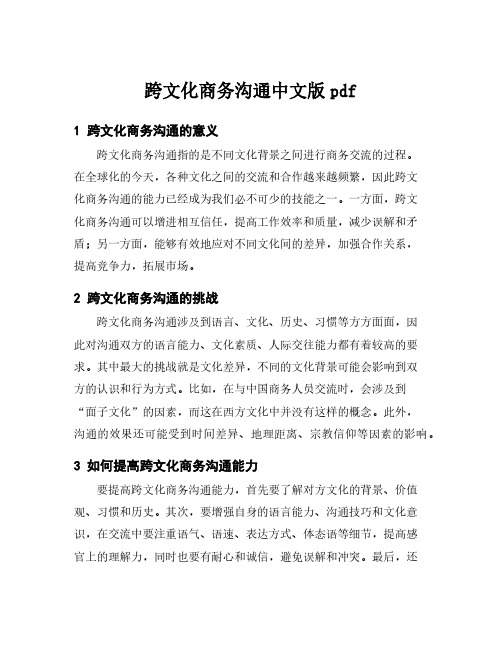跨文化商务沟通整理
商务礼仪与跨文化交际

商务礼仪与跨文化交际1. 引言商务礼仪与跨文化交际是在国际化和全球化的背景下,对于商业领域中个体或组织之间的交流和合作至关重要。
本文将介绍商务礼仪的概念、重要性以及如何跨越不同文化背景进行有效的商务沟通。
2. 商务礼仪概述商务礼仪是指在商业场合中,根据社会习俗和道德规范来行事的一种行为准则。
它包括言谈举止、着装规范、餐桌礼仪、身体语言等方面的要求。
良好的商务礼仪有助于建立良好形象,增强信任,并推动商业合作取得成功。
2.1 言谈举止•注意用语和控制说话音量,避免使用冒犯性词汇。
•注意听取他人意见并及时回应。
•站立时保持姿势端正,坐下时保持直立且尊重对方。
2.2 着装规范•根据具体场合选择适当的服装,避免过于随意或过于正式。
•遵守当地的着装规范和习惯,尊重对方文化。
2.3 餐桌礼仪•使用正确的餐具,并掌握基本的餐桌礼仪。
•尊重对方饮食习惯和禁忌,避免冒犯他人。
2.4 身体语言•注意维持适当的眼神接触,展示自信和尊重。
•注意姿势、手势和表情,表达积极、友好的态度。
3. 跨文化交际技巧在跨文化交际中,了解和尊重不同文化背景是非常重要的。
以下是一些跨文化交际技巧:3.1 倾听与学习•尊重并倾听来自不同文化背景的观点和意见。
•学习有关对方文化中重要的价值观、信仰和礼仪习俗等内容。
3.2 开放心态与谦虚•对于不同的观点持开放心态,并愿意接受其他文化视角。
•谦虚地接受并纠正自己可能存在的误解或偏见。
3.3 适应和灵活性•遵守对方文化的习俗和规则,尽量适应当地环境。
•在跨文化场合中展示适度的灵活性和亲近感。
4. 商务沟通技巧商务沟通是商务交际的重要环节,以下是在商务沟通中应该注意的一些技巧:4.1 调整语速和语言风格根据对方能力和理解程度,调整语速和语言风格,确保信息清晰地传达给对方。
4.2 注意非语言表达除了语言,还要注意肢体语言、面部表情以及声音、强调等非语言信号的传达。
4.3 提问与倾听通过提问来了解对方需求与期望,并通过倾听来积极回应,并表达自己的意见。
跨文化商务沟通的技巧与策略

跨文化商务沟通的技巧与策略随着国际交流的不断加强,跨文化商务已成为当前商业界的热门话题之一。
然而,不同的文化背景往往带来了沟通障碍,给跨文化商务带来了很大的挑战。
为了有效地解决这些问题,本文将讨论一些跨文化商务沟通的技巧和策略。
1.了解对方文化了解对方文化是跨文化商务沟通的基础。
这不仅包括了对语言的熟悉和语言交流技巧的掌握,还包括了对文化差异、礼仪和行为规范的了解。
例如,在西方文化中,直接表达和坦率地讲话被视为一种品质。
但在亚洲文化中,对话方式常常更加委婉、客气和谨慎。
因此,为了避免误解和冲突,我们需要了解对方的文化背景,深入了解其社会和商业环境。
在了解对方文化的基础上,我们才能够更好地理解、预测和解决跨文化商务中出现的问题。
2.避免使用口头语言和行话当你和来自不同文化背景的人交流时,避免使用口头语言和行话。
因为这些词汇可能只在你的本土文化中使用,可能会被其他人认为是难以理解或晦涩难懂。
因此,你应该尽可能地使用通俗易懂的词汇和措辞,以确保信息传递的清晰性和准确性。
3.倡导文化包容性对于跨文化商务,我们需要提倡文化包容性。
这意味着我们应该尊重和包容不同文化背景和社会习惯。
尽可能地与对方建立互信和合作关系。
这些关系的建立可以帮助我们消除文化障碍,促进不同文化之间合作和交流的顺利进行。
4.适当的肢体语言除了说话外,肢体语言也是跨文化商务沟通中非常重要的一部分。
肢体语言是跨文化交流的一种非语言表达和传达方式。
它与文化息息相关,但它们不同的文化背景可能会带来不同的意义。
例如,在一些文化中,握手代表着“欢迎”和“友谊”。
但在一些文化中,人们可以微笑、鞠躬或其他肢体语言表示对朋友或客人的欢迎和尊重。
因此,我们需要对跨文化肢体语言的差异进行深入的了解,遵循当地的礼仪和行为规范,并适当地调整我们的肢体语言和行为风格。
5.积极倾听和互动最后,跨文化商务沟通中还需要积极的倾听和互动。
这意味着我们需要认真聆听对方的观点,以确保双方的信息传递的准确性和清晰性。
跨文化商务沟通中文版pdf

跨文化商务沟通中文版pdf
1 跨文化商务沟通的意义
跨文化商务沟通指的是不同文化背景之间进行商务交流的过程。
在全球化的今天,各种文化之间的交流和合作越来越频繁,因此跨文
化商务沟通的能力已经成为我们必不可少的技能之一。
一方面,跨文
化商务沟通可以增进相互信任,提高工作效率和质量,减少误解和矛盾;另一方面,能够有效地应对不同文化间的差异,加强合作关系,
提高竞争力,拓展市场。
2 跨文化商务沟通的挑战
跨文化商务沟通涉及到语言、文化、历史、习惯等方方面面,因
此对沟通双方的语言能力、文化素质、人际交往能力都有着较高的要求。
其中最大的挑战就是文化差异,不同的文化背景可能会影响到双
方的认识和行为方式。
比如,在与中国商务人员交流时,会涉及到
“面子文化”的因素,而这在西方文化中并没有这样的概念。
此外,
沟通的效果还可能受到时间差异、地理距离、宗教信仰等因素的影响。
3 如何提高跨文化商务沟通能力
要提高跨文化商务沟通能力,首先要了解对方文化的背景、价值观、习惯和历史。
其次,要增强自身的语言能力、沟通技巧和文化意识,在交流中要注重语气、语速、表达方式、体态语等细节,提高感
官上的理解力,同时也要有耐心和诚信,避免误解和冲突。
最后,还
需要积极主动地了解外部环境和市场情况,扩大自己的视野和经验,从而成为一名跨文化商务人才。
总之,跨文化商务沟通是一项重要的技能,可以帮助我们更好地理解世界和促进商务关系的发展。
通过认真学习和不断练习,我们一定能够成为优秀的跨文化商务人才。
商务谈判与跨文化沟通技巧与商务沟通

商务谈判与跨文化沟通技巧与商务沟通在今天全球化的商业环境中,商务谈判和跨文化沟通已经成为商业成功的重要组成部分。
有效的商务沟通和跨文化沟通技巧对于不同文化背景的商业伙伴之间的合作至关重要。
本文将介绍商务谈判和跨文化沟通的重要性,并提供几种有效的沟通技巧,以帮助您在跨文化商务环境中取得成功。
商务谈判是商业中的一个重要环节。
在商务谈判中,双方会就某项商业协议或交易进行讨论和协商。
成功的商务谈判需要双方建立可靠的沟通渠道,并能够理解和尊重对方的立场和需求。
在商务谈判中,双方往往来自不同的文化背景,这导致了跨文化沟通成为一个挑战。
在跨文化商务环境中,了解对方的文化背景和价值观是至关重要的。
不同的文化背景可能会导致对同一问题的不同理解和看法。
为了避免误解和冲突,双方应该尽可能了解对方的文化特点,并尊重对方的文化差异。
这将有助于建立信任和合作关系。
除了了解文化差异外,有效的商务谈判还需要掌握一些跨文化沟通技巧。
首先,语言是沟通的基础。
如果双方的母语不同,使用共同的第二语言进行交流可能是最好的选择。
确保使用简单明了的语言,避免使用难以理解或模糊的术语。
此外,注意语速和语调,确保对方能够清楚地听到和理解您的意思。
其次,非语言沟通也是商务谈判中重要的一部分。
肢体语言、面部表情和眼神接触等非语言信号可以传达大量信息。
然而,这些非语言信号在不同的文化中可能具有不同的含义。
因此,当进行跨文化商务谈判时,要尽量避免使用具有歧义的非语言信号,以免给对方造成困惑。
第三,倾听并尊重对方的观点和意见至关重要。
在商务谈判中,双方可能会就某个问题产生分歧。
然而,要实现良好的商业关系,双方必须学会倾听对方的观点,并尊重对方的意见。
尽量避免直接表达不同意见或批评对方的立场,而是寻求共同点,协商解决方案。
最后,建立信任是跨文化商务谈判中的关键要素。
在商业合作中,双方需要建立起互信和合作的基础。
为了建立信任,双方需要遵守承诺,诚实相待,并充分尊重对方的文化和信仰。
国际商务礼仪:跨文化商务交流的技巧

国际商务礼仪:跨文化商务交流的技巧引言在现代全球化的商业环境中,国际商务交流变得越来越普遍。
随着越来越多的公司将业务扩展到不同的国家和地区,跨文化交流的重要性也与日俱增。
在进行国际商务交流时,了解和尊重不同文化背景的商务礼仪是至关重要的。
本文将介绍一些跨文化商务交流的技巧,帮助读者在国际商务场景中获取成功。
跨文化差异的重要性人们在不同国家的行为方式和价值观差异在国际商务交流中,人们来自不同的国家和地区,他们的行为方式和价值观可能存在差异。
例如,在某些国家,直接表达个人意见被认为是不礼貌的,而在其他国家,直接和坦率的沟通被视为积极的品质。
了解这些差异将有助于避免误解和尴尬,并在商务交流中建立起更好的互信关系。
不同地区的商务礼仪每个国家和地区都有自己独特的商务礼仪。
例如,在日本,名片被认为是非常重要的商务工具,因此在交换名片时需要使用正确的方式。
而在西方国家,人们更注重直接的眼神交流和握手。
在了解和遵守不同地区的商务礼仪之前,务必做一些研究,以确保不会冒犯对方。
跨文化商务交流的技巧建立信任和尊重在国际商务交流中,建立互信关系是至关重要的。
确保展示出尊重对方文化的懂得,并尽量避免出现冒犯或做出无意中伤害他人的事情。
了解对方文化的一些基本知识,如习俗、宗教和社会规范,将帮助确保交流的顺利进行。
学习基本的礼仪规范不同国家和地区有着不同的商务礼仪规范。
学习并遵守这些规范至关重要。
例如,在一些亚洲国家,弯腰是一种表示尊敬的姿势,而在西方国家,直立站立并与对方目光交流是更常见的做法。
通过学习和了解正确的礼仪规范,我们能够在商务交流中展示出尊重和敬意,从而建立起良好的商业关系。
语言和沟通技巧语言是跨文化商务交流的重要方面之一。
然而,在不同的国家和地区,使用的语言和交流方式可能不同。
确保使用清晰简洁的语言,避免使用难以理解的行话和俚语。
此外,尽量使用简单的句子和词汇,以确保对方能够理解你的意思。
如果你不确定自己的语言表达是否准确,可以要求对方重复你的意思或询问是否有任何误解。
与不同文化顾客的沟通话术要点

与不同文化顾客的沟通话术要点在如今的全球化时代,跨文化交流已经成为商业领域中不可或缺的一部分。
对于经营着全球业务的企业而言,与不同文化背景的顾客进行有效沟通是至关重要的。
如何克服语言障碍、尊重不同的价值观和习俗,建立起良好的关系,这些都是成功跨文化沟通的关键。
本文将介绍与不同文化顾客沟通的一些要点,以帮助企业在全球市场中取得更好的业绩。
首先,跨文化沟通需要我们学会尊重和欣赏对方的文化。
我们应该了解并尊重他人的价值观、信仰和习俗,不要轻易批评或贬低他们的文化。
在与顾客交流时,要保持开放的态度,尽可能了解他们的文化差异,并表达自己愿意倾听和学习的意愿。
尊重和欣赏对方的文化将有助于建立信任和友好的关系。
其次,语言是跨文化沟通中最基本的一环。
与不同文化顾客沟通时,要尽量使用简单明了的语言,避免使用复杂的词汇或难以理解的术语。
如果双方存在语言障碍,可以尝试使用简单的手势或图片来帮助沟通。
此外,对于一些特定文化背景的顾客,他们可能更习惯使用母语进行沟通。
在这种情况下,提供多语言的服务或与当地的翻译人员合作是很有帮助的。
然后,要注重非语言沟通的重要性。
当我们与不同文化顾客进行交流时,其实只有小部分的信息是通过语言传递的。
姿态、面部表情、眼神、肢体动作等也都是重要的非语言沟通方式。
要注意并尊重对方的身体语言,同时也要注意自己的言行举止。
例如,在一些文化中,直接的目光接触可能被视为不礼貌或挑衅,而在另一些文化中则是表示尊重的表现。
因此,在跨文化沟通中,我们需要学会解读对方的非语言信号,并适应他们的沟通方式。
此外,了解并避免文化误解也是跨文化沟通的重要要点。
在与不同文化背景的顾客进行交流时,我们要谨慎避免使用可能引起误解的语言或行为。
例如,一些国家或地区可能对特定的题材或话题存在敏感性,我们应该避免触碰到这些话题,以免引起不必要的争议或冲突。
此外,还应该注意性别、年龄和社会地位等因素在不同文化中的差异,以避免不恰当的行为或言辞。
简述有效的跨文化商务沟通技巧

简述有效的跨文化商务沟通技巧
有效的跨文化商务沟通技巧包括以下几点:
1. 尊重文化差异:了解并尊重不同文化的价值观、习俗和规范,避免对其他文化进行贬低或歧视。
2. 积极倾听:倾听对方的需求、关注点和意见,展示对对方的尊重和理解。
3. 明确信息表达:清晰、简洁地表达自己的观点,避免使用可能引起误解的模糊或含糊的语言。
4. 适应沟通风格:根据不同文化的沟通风格调整自己的方式,例如在表达反对意见时,某些文化可能更直接,而其他文化可能更倾向于委婉的表达。
5. 灵活应对:对沟通中可能出现的问题保持灵活和开放的态度,及时调整策略以适应不同的情况。
6. 建立信任:通过诚信和透明的沟通建立信任关系,这有助于缓解可能出现的冲突和误解。
7. 使用合适的非语言沟通:例如肢体语言、面部表情和目光接触,这些在跨文化沟通中可能起到重要的作用。
8. 持续学习和适应:不断学习和了解不同的文化,以便更好地适应各种商务环境。
9. 建立共同的理解:寻找不同文化间的共同点,促进更深层次的理解和交流。
10. 求助于专业人士:在必要时,可以求助于翻译、文化指导或语言专家,以确保信息的准确传达。
以上就是一些有效的跨文化商务沟通技巧。
希望对你有所帮助。
跨文化商务沟通技巧解析中国与印度之间的商业交流策略

跨文化商务沟通技巧解析中国与印度之间的商业交流策略跨文化商务沟通在全球化时代的商业交流中显得异常重要。
中国和印度作为两个重要的新兴经济体,在商业领域的合作与交流越来越频繁。
然而,由于两国的历史、文化和商业习惯存在差异,跨文化商务沟通的挑战也显著增加。
本文将探讨中国和印度之间的商业交流策略,帮助企业更好地理解两国之间的差异并改善沟通效果。
1. 文化差异意识在进行中国和印度之间的商业交流前,首先要有意识地了解和尊重两国的文化差异。
中国的商务文化强调对等和尊重的原则,而印度则注重家族和社会等因素的影响。
因此,在与中国商人交流时,适当的尊重和礼仪非常重要,而在与印度商人交流时,建立良好的人际关系和社交网络则更加重要。
2. 语言和口头表达语言是文化传递的主要手段之一。
尽管在国际商务中英语的使用越来越普遍,但中国和印度仍保留着各自的官方语言和地方方言。
为了更好地进行商务沟通,了解对方的语言背景,并尽可能使用对方的官方语言进行交流将大大提高沟通效果。
此外,在口头表达中,要注意语速、发音和表达方式的差异。
中国人在商务交流中一般倾向于直接表达,而印度人可能更倾向于委婉和间接的表达方式。
因此,在进行商务谈判和合作时,我们需要灵活运用不同的口头表达方式来适应对方的习惯,以避免造成不必要的误解和冲突。
3. 非言语沟通除了语言表达,非言语沟通也是商务交流中重要的组成部分。
在中国和印度,身体语言、姿态和面部表情等非言语信号的解读方式也存在差异。
中国人更注重面子和礼仪,表达方式相对保守;而印度人可能更加热情和开放。
因此,在商务交流中,要仔细观察对方的非言语信号,并灵活运用自己的身体语言来传递信息和理解对方的意图。
同时,尽量避免在商务交流中使用手势或姿态可能引起对方误解的行为。
4. 时间观念和灵活性时间观念在中国和印度之间也存在差异。
中国商务活动注重准时和高效率,而印度可能更注重人际关系和灵活性。
因此,在商务交流中,要尊重对方的时间观念,并尽量做到准时和有条理。
- 1、下载文档前请自行甄别文档内容的完整性,平台不提供额外的编辑、内容补充、找答案等附加服务。
- 2、"仅部分预览"的文档,不可在线预览部分如存在完整性等问题,可反馈申请退款(可完整预览的文档不适用该条件!)。
- 3、如文档侵犯您的权益,请联系客服反馈,我们会尽快为您处理(人工客服工作时间:9:00-18:30)。
跨文化商务沟通期末考试的复习内容一、单选题(10题×2分=20分)1、__A____ i s called interracial communication。
A.The communication between African Americans and European Americans.B.The communication between two people‘munication we have with ourselvesD.Interactions among people from different nations.2、The nail that sticks up gets hammered down is a proverb revealing____.A. individualismB. collectivismC. self-centeredD. independence3、The colour red means prosperity(繁荣、兴旺)in___D_____ .A. AmericanB. EnglandC. SpainD. China4、“Yellow dog” refers to ___C___ in England.A.someone who is happyB. Someone who is braveC. Someone who is coward(卑鄙的)D. Someone who is sad.5、A:Thank you so much for what you have done for me and I really appreciate your kindness.B:___C_____ (If you were B, which of the following you would choose as a polite and proper answer)A. It’s my duty to do so.B. No, it’s nothing.C. It’s my pleasure.D. It’s what I Should do.6、___C___ i s not one of the countries with high-context communication.A. ChinaB. MexicoC. CanadaD. Japan7、__D_____ belongs to low uncertainty avoidance.(不确定性回避)A.People develop many rules to control social behaviors.B.People tend to worry abort the future.C.People have a high level of anxiety.D.People believe in accepting dissent among cultural members .8、___C____ tends to be feminine(娇柔倾向)country.A.JapanB. EnglandC. DenmarkD. Germany9、Owl(猫头鹰)is the symbol of misfortune(不幸)in___D____ 。
A. AmericanB. EnglandC. SpainD. China10、___D____ adopts monochromic(单向计时制)time system.A. ChillB. BrazilC. ArgentinaD. England.is called intrapersonal communication.A. The communication between African Americans and European Americans。
B. The communication between two people。
C. Communication we have with ourselves。
D. Interactions among people from different nations.2.“The nail that sticks up gets hammered down”is a proverb from_A____3.“A red rag to a bull”(火冒三丈)may stem from___D____ .4.The color yellow means young in__A_____ .A.American5.__B_____is not one of the countries with low-context communication.A.American6.___A____ belongs to high uncertainty avoidance.A.People develop many rules to control social behaviors.B.People are willing to accept change and takes risks.C.People have a high tolerance for uncertainty and ambiguity.D.People believe in accepting dissent among cultural members.7.___A____ tends to be masculine(阳刚倾向)country.A.Japan8.___C____ adopts polychronic(多项计时制)time system.9.Cow is worshiped in___A____ .10.The word “Hippie” is from ___D____ .A.England二、True or False.判断正误(10题*2分=20分)1.Japanese culture prefers directness and face-caving behaviors.2.It’s normal to point the soles of your shoes or feet towards the otherperson when you sit in Indonesia.3.Americans highly value positive nonverbal displays and typically regard someone who smiles as more intelligent than someone who does not.4.All people of the same nationality will hare the same culture.5.Culture can be seen as shared knowledge what people need to know in order to act appropriately in a given culture.1.Encoding is the process of putting ideas into symbols.2.Although cultures do change. most changes affects only the surface structure of the culture.3.Culture is a static (静态的)entity while communication is a dynamic process.4.Women are frequent participants on a Japanese negotiation team.5.Western women usually like Chinese to touch their bodies or small children.6.Cultural mistakes are more serious than linguistic mistakes. The linguistic mistake means that someone is not fully expressing his or her idea while cultural mistakes can lead to serious misunderstanding and even ill-feeling between individuals.7.One’s actions are totally independent of his or her culture.8.All cultures require and value politeness, but the ways in which politeness is achieved may vary significantly.9.In informal situations, a large number of compliments(恭维)are used tomake people feel comfortable.10.“Dragon” means the same to the westerner as “龙”to the Chinese.三、名词解释(5题*3分=15分)1、intercultural communication 6、power distance. √2、Collectivism 7、nonverbal communication3、values√8、individualism4、masculinity√9、femininity5、polychromic time system√10、Monochromic time system√具体解释:1.Intercultural communication:face-to-face interactions among people of diverse cultures.2.Collectivism:A society low individualism would likely endorse, order,conformity in group relationships,deference to group norms,family relationship and loyalty to consensus:values can be defined as broad preferences concerning appropriate courses of action or outcomes. As such, values reflect a person's sense of right and wrong or what "ought" to be.,” Equal rights for all", "Excellence deserves admiration", and "People should be treated with respect and dignity" are representative of values. Values tend to influence attitudes and behavior. (阳刚倾向):refers to a kind of values that the society advocates the dominance of the masculine characteristics such as decisiveness,assertiveness, and competitiveness, traits that reflect traditional manly values of control over events.time system(多向计时制):Polychromic time system is a kind of viewpoint and attitude toward time, which means that several things are being done at the same time.distance:can therefore be defined as the extent to which the less powerful. Members of insititutions and organizations within a country except and accept that power is distributed unequally.communication:(非语言交际)is communication through means other than language---for example,facial expression personal space, eye contact, use of time,and conversational silence.:this dimension measure the degree to which a society values independent initiative to collective effort.:(娇柔倾向)feminine orienlations focus on nurturing relationships and human interactions. They display limited emphasis on competitive dominance.time system: monochromic time system is a king of viewpoint and attitude toward time, which means that things should be done one at a time, and time is segmented into precise, small units.四、简答题(5题*5分=25分)1、What is noise in communication?√2、What are the characteristics of culture?3、How much do you know about Japanese people? And how can you communicate well with them?√4、What is high-context communication?√5、What is the Chinese dream? √6、What are the components of communication?√7、What are the ingredients of culture?√8、What is low-context communication?√9、How much do you know about German People? And how can you communicate will with them?10、What is American Dream?1.What is noise in communication?The term noise technically refers to anything that distorts the message the source encodes. Noise can be of many forms:external noise can be the sights,sounds, and other stimuil that draw youe attention away from the a radio on while reading is external noise refers to your thoughts anf feelings that can interfere with the message.are the characteristics of culture?Six characteristics of culture are of special importance to intercultural commumication:(1)culture is learned (2)culture is transmissible.(3)culture is dynamic.(4)culture is selective.(5)the facets of culture are interrelated.(6)culture is ethnocentric. much do you know about Japanese people. And how can youcommunicate well with them?Japanese people are very polite and they are very patient in business, they don't like talkative persons and they never refuse others directly. Based on the knowledge, i will try to confirm to their characteristics. i will not talk too much and too quickly when communicating with them, i will be polite and patient and try to get the implied meaning from the other party, if necessary i will ask them in a very directly and politely.is high-context communication?It is a kind of communication style in which the meaning rely heavily on hidden, implicit, contextual cues such as nonverbal behavior, social context, and the nature of interpersonal relationships. The focus is on the meaning between lines, and the receiver is required to catch the implied meaning of the speaker.is the Chinese Dream?Chinese Dream is a term popularized After 2013 within Chinese socialist thought that describes a set of personal and national ideals in the People’s Republic of China and the Communist Party of China. It is used by journalists, government officials, and activists to describe the role of the individual in Chinese society as well as the goals of the “Chinese nation”, The dream is described as “national rejuvenation, improvement of people’s livelihoods, prosperity, construction of a better society and a strengthened military.are the components of communication?They are: source, encoding, message,channel, noise, receiver, decoding,receiver/response,feedback context.are the ingredients of culture?Cultures may be classified by three large categories of elements: artifacts(man-made things), concepts(such beliefs and ideas in people's mind) and behaviors (human being's activities and actions)is low-context communication?It is a kind of communication style in which the meaning of the message is expected to be explicit, direct, and unambiguous.The speaker is required to express the meaning as clear as possible.what is power distance?This dimension measures a society's emphasis on human inequalities. A culture high in power distance would value hierarchical status and authority. in contrast, countries that scored low on power distance don't take it serious, and superiors and subordinates feel relatively comfortable with shared decision making and Decentralization.what are the components of communication?They are: source, encoding, message,channel, noise, receiver, decoding,receiver/response,feedback context.Answer the following questions according to your knowledge.What is noise in communication?What are the characteristics of culture?How much do you know about Japanese people? And how can you communicate well with them?What is high-context communication?What is the Chinese Dream?赞扬人的外貌You have a beautiful smile.Your hairstyle looks nice.性格You have a good sense of humor.You have got a great personality.家庭成员Your wife is beautiful.Your kid is cute.能力You have done a good job.You did a good presentation.财物Your car is nice.五、案例分析(2题*10分=20分)Case 1:Yang Ruifang worked as a secretary in an Australian company in Melbourne. She became friendly with one of the Australian secretaries, a woman named Cathy two usually ate lunch together and Yang Ruifang often asked Cathy for advice on problems she she faced adjusting to Australian gave her a tot of advice and helped her move from one apartment to went with Yang Ruifang to the immigration Bureau severaltimes to help sort out some Ruifang visited Cathy several times at home but did not incite Cathy to her apartment,becauseshe shared it with four other people if they did not see ouch other over the weekend,they usually talked on the telephone.As Yang Ruifang was also preparing to take on English test, she was able to get a lot of help with English in this , something seemed to be going wrong Cathy seemed to be getting impatient, even a Little cold , She started going out by herself at lunchtime instead of eating with Yang, and seemed reluctant to answer questions. Yang Ruifang was puzzled. She couldn't imagine the problem was.Analysis:the definition of friendship is different between Chinese and Western countries culture, in China, we think that we should do things all as one wishes and stay together everyday—eating together, shopping together and so on. We always say—“A friend indeed is a friend in need”.In this case, ruifang treat his secretary like this way makes her secretary feel uncomfortable. In western countries, no matter how intimate their friendship is, they should make an appointment in advance, and they should have their own private space.Case 2:Linhua has accompanied an American delegation to visit have experienced the hospitality of the Chinese people. After returning to America, Linhuaonce visited were so glad to meet again. Linhua offered to host the meal, but they refused. They ordered their own dish, and Linhua ordered her own. When footing the bill, they only paid their part, and no one wanted to pay for found them so inhospitable, though she knew the .Analysis:In China, people usually invite guests to have a meal at home to express their hospitality, and even have a meal outside, they also always pay the overall bills. However, in America, they always pay the bill for themselves when they have a meal outside to express the equality.Case 2:One cold winter day in a Chinese city, Wang Lin on his way to the library met an American professor who knew very little about greeting him,Wang said:“It’s rather ’d better put on more clothes.”But the professor didn’t appear happy on hearing this.Analysis:Americans and most western countries’ people dislike to be told how to do the things. They intend to be independent. However, in China, people are accustomed to care about others. In this case, Wang lin’s suggestion express a regard to others, but to Americans, it’s not they want to accept.Analysis:In the West,it is very Common for family members to praise each other ,and they will fell very happy and comfortable to do ,Chinese people seldom praise their family members in tend to be very humble,and areused to depreciating their family Members’good the west , it is not proper to describe one’s wife as old woman, and “you have a beautiful wife”is a very common and popular praise. While in China , it is not proper to praise one’s wife in this way.A famous Chinese actress married a German. One day when she was acting, her husband wasThere watching,saying again and again that she was the best actress. The actress’ colleaguesPresent asked her afterwards to tell her husband not to praise his own wife like that in public. On Learning this,the German wondered what he did wrong. Once the actress and her husband were talking with their Chinese friends at a3, the definition of friendship is different between Chinese and Western countries culture, in China, we think that we should do things all as one wishes and stay together everyday—eating together, shopping together and so on. We always say—“A friend indeed is a friend in need”.In this case, ruifang treat his secretary like this way makes her secretary feel uncomfortable. In western countries, no matter how intimate their friendship is, they should make an appointment in advance, and they should have their own private space.。
